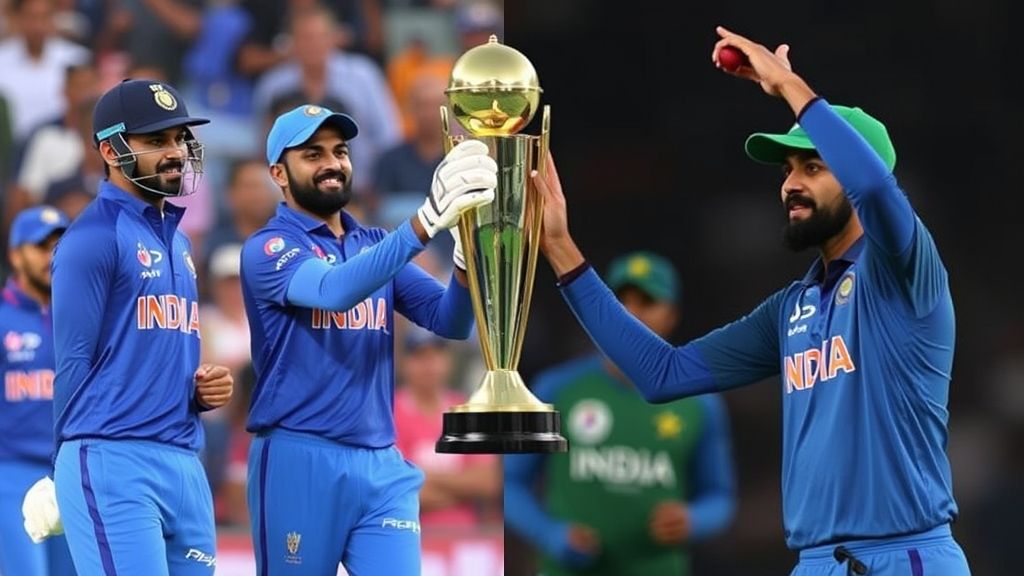The roar of victory, the palpable tension, the nail-biting finish – the Asia Cup final between arch-rivals India and Pakistan delivered all the drama cricket aficionados crave. India emerged victorious in a thrilling encounter, clinching the coveted title with a mere two balls to spare. However, what followed this spectacular win has sent shockwaves through the cricketing fraternity: the Indian team’s surprising refusal to claim the trophy. This unprecedented decision has ignited a fervent debate, prompting a deep dive into the reasons behind this symbolic protest and its potential implications.
A Spectacle of Skill and Sportsmanship, Followed by a Statement
The Asia Cup final was a testament to the enduring rivalry between India and Pakistan, two cricketing titans whose encounters are etched in history. The match, held at a packed stadium, witnessed a captivating display of talent. Pakistan, after a strong showing, set a challenging target, putting immense pressure on the Indian batting lineup. Every run, every wicket, every dot ball was met with an electrifying response from the passionate crowd.
India’s chase was a masterclass in controlled aggression and strategic batting. Key performances from their seasoned batsmen, coupled with crucial contributions from the lower order, kept the spectators on the edge of their seats. As the equation tightened, the tension escalated, with the outcome hanging precariously in the balance. Ultimately, a masterful flick of the wrists or a well-timed pull shot sealed the victory for India, triggering scenes of unadulterated joy amongst their supporters.
Yet, amidst the jubilation and post-match analysis, a peculiar silence descended. Reports began to emerge that the Indian team, despite their heroic win, had opted out of the official trophy presentation ceremony. This was not a fleeting decision; the players, led by their captain, conveyed their stance to the organizing committee, choosing to forgo the customary act of lifting the trophy.
Unpacking the Reasons: More Than Just a Protest
The refusal to accept the Asia Cup trophy by the Indian cricket team is a decision that demands careful consideration. While the immediate reaction was one of disbelief and speculation, several underlying factors likely contributed to this extraordinary move. Understanding these motivations provides a crucial context for the event.
Addressing Perceived Injustices in Tournament Scheduling and Format
One of the primary reasons cited for India’s stance appears to be dissatisfaction with the tournament’s scheduling and format. The Asia Cup, particularly in its recent iterations, has faced criticism for its packed schedule and the perceived imbalance in playing conditions. India, having participated in a grueling series leading up to the Asia Cup, including the demanding Test series against England, found themselves with very little rest before the continental championship.
Furthermore, the tournament’s structure, which often sees teams playing a significant number of matches in quick succession, can lead to player fatigue and increase the risk of injuries. The intensity of international cricket demands peak physical and mental conditioning, and a relentless schedule can compromise this. India, as a team that consistently competes at the highest level across all formats, is particularly sensitive to the impact of such demanding schedules on player welfare.
A Stand for Player Welfare and Sustainable Cricket
This refusal can be interpreted as a powerful statement advocating for player welfare and a more sustainable approach to cricket tournaments. The relentless demands of modern cricket, with its various leagues and international commitments, have raised concerns about burnout among players. By choosing to forgo the trophy, India may be highlighting the fact that the physical and mental toll on players often overshadows the glory of individual victories.
This move aligns with a growing global conversation about the importance of prioritizing athletes’ well-being. For example, discussions around mental health in sports have gained significant traction, and excessive scheduling is a direct contributor to mental fatigue. By taking this stand, India is implicitly urging cricket boards and organizing bodies to re-evaluate the calendar and ensure that player health is paramount.
The Symbolic Power of Refusal
In the realm of sports, actions often speak louder than words. The Indian cricket team’s refusal to accept the trophy is a potent symbolic gesture. It communicates a message that transcends the immediate victory. It suggests that while wi
ing is important, the conditions under which that victory is achieved, and the overall health of the sport, are equally, if not more, significant.
This act can be seen as a form of protest against a system that, at times, seems to prioritize commercial interests and an ever-increasing number of matches over the longevity and well-being of its most valuable assets – the players. It’s a call for a more holistic approach to the game, one that fosters sustainable excellence rather than fleeting success at the cost of player health.
What Lies Ahead: Implications and Future Considerations
The Indian team’s unprecedented decision in the Asia Cup final has far-reaching implications for the future of cricket. It has undoubtedly opened a dialogue that was perhaps long overdue, prompting stakeholders to reflect on the current state of the sport.
A Catalyst for Change in Tournament Management
This incident could serve as a significant catalyst for change in how cricket tournaments are pla
ed and executed. Cricket boards and international bodies will likely face increased pressure to:
Rethink Scheduling: Develop more player-friendly schedules that allow for adequate rest and recovery between matches and series.
Prioritize Player Health: Implement robust player welfare programs and consider the cumulative impact of a packed calendar on physical and mental health.
- Consult Players: Engage in more open dialogue with players and their representatives when designing tournament formats and schedules.
The Debate on Player Autonomy and Board Authority
The situation also brings to the forefront the delicate balance between player autonomy and the authority of cricket boards. While players are the performers, boards are responsible for the governance and organization of the sport. India’s stance highlights the potential for players to exert influence when they feel their welfare is being compromised, sparking discussions about the extent of their influence in decision-making processes.
A Lesson in Values Beyond Victory
For fans and aspiring cricketers alike, this event offers a valuable lesson. It underscores that true success is not solely defined by trophies lifted but also by the principles upheld and the values demonstrated. India’s refusal, though unconventional, sent a powerful message about prioritizing long-term well-being and advocating for a healthier sporting ecosystem.
In conclusion, India’s victory in the Asia Cup final was a remarkable sporting achievement. However, their subsequent refusal to claim the trophy has overshadowed the on-field triumph, sparking a critical conversation within the cricketing world. This unprecedented move, rooted in concerns over scheduling, player welfare, and a desire for a more sustainable game, has undoubtedly put the spotlight on issues that require immediate attention. The cricketing fraternity now awaits to see if this powerful statement will translate into tangible changes, ultimately benefiting the sport and its athletes in the long run.


